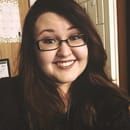When we talk about women empowerment, what do we mean by women? Do we mean all women? This was a point raised by Rugile Butkevičiūtė, an international fellow at George Mason’s Women and Gender Studies Department, on Tuesday, September 18th, at the “Global Perspectives of Women and Gender Issues” panel. The panel featured three speakers–Sahar Sarsour, Onyinye Edeh, and again, Rugile Butkevičiūtė–and was an exercise in thinking about the different needs of women across the globe.
Sahar Sarsour
Via GMU Student Media
Sahar Sarsour is from Gaza, Palestine. She is a current fellow with George Mason’s Student Media and participent of Community Solutions. She first spoke to us about her home, Gaza City, and how, despite being witness to two wars, it is still home to many creatives and innovators. Sarsour works with Press House-Palestine, an organization that protects journalists, provides training and gives them a platform. When Sarsour first began her work with Press House-Palestine she found that the journalists were overwhelmingly male. Sarsour explained that there is little opportunity for women in Palestine to join the workforce, and that additionally, many women are raised to believe that they must stay at home after graduating from school. Her goal is to begin a program for women in Palestine that will train them as journalists and teach them English so that their work can be circulated worldwide.
Onyinye Edeh
Via the Strong Enough Girls Organization
Onyinye Edeh is a fellow with the Institute of Current World Affairs (ICWA). Each year the ICWA chooses three fellows to examine a specific issue within a country for two years. For Edeh, she chose to examine women empowerment within her home country of Nigeria. Nigeria has the highest amount of young people out of school, a majority of whom are girls. For families living in poverty, boys are prioritized in receiving an education whereas many girls are forced to work in order to provide for the family. Many girls are forced into child marriages following puberty, and female genital mutilation is a persistent issue within many communities of Nigeria. Edeh has also partnered with the Centre for Girls Education (CGE), and seeks to engage with local leaders so that the voices of women in Nigeria are heard.
Related: The Resilience of Women
Rugile Butkevičiūtė
Via the GMU Women and Gender Studies Department
Rugile Butkevičiūtė is from Lithuania, and like Sarsour, is also with Community Solutions. She is an activist, a lawyer and a mother. After graduating with an MA in business law, her first job was with the Women’s Issues Information Centre where she provided legal consultations for women who had experienced domestic violence. Butkevičiūtė explains that in Lithuania, domestic violence is viewed as a “soft issue,” and that similar to the US, normalized rape culture makes it difficult for survivors of abuse to find their voice. However, the country has been making great strides in recent years with the increasing prevalence of support centers similar to the Women’s Issues Information Centre. Still, many organizations lack intersectionality in their work. Since Lithuania isn’t very diverse, she hopes to stir awareness of all women’s issues.
The panel was co-sponsored by the Women and Gender Studies Department, the African and African-American Studies Department, and Student Media. It was hosted by the Associate Director of the Women and Gender Studies Department, Nancy Xiong, and moderated by Krystalyn J. Morton, Associate Director of the Women and Gender Studies Department.
It’s important to recognize the struggles of our fellow women around the world, and the ways in which they may or may not overlap with our own. Think local and act global out there, collegiettes! And don’t forget to check out the rest of the Women and Gender Studies Department’s upcoming events.



